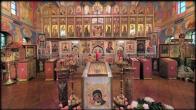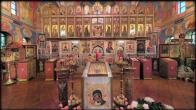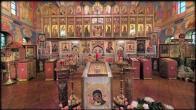You are here
The Ascetic Struggle of Self-Denial: On the Beheading of John the Forerunner

St. John the Forerunner’s entire life was one of the ascetic struggle of self-denial and following Christ. In his youth he went into the desert so that, alone with God, he might come to know the path of God’s wisdom and prepare himself for an encounter with Christ. Later, having returned to the people, he began to admonish them, calling them to repentance. Many came to him: the rich and poor, the virtuous and sinners. They confessed their sins to him, and he baptized them in water, saying: “He that cometh after Me is mightier than I” (Matthew 3:11). And when people who heard his preaching wondered whether he was Christ or not, he said: “He it is, Who coming after me is preferred before me, Whose shoe’s latchet I am not worthy to unloose” (John 1:27). And when Christ came to be baptized of him, he told the people: “Behold the Lamb of God, Which taketh away the sin of the world (John 1:29).
Jesus Christ began His preaching with the same words as John the Baptist: “Repent: for the Kingdom of Heaven is at hand” (Matthew 4:17). There existed a very close connection between John the Baptist and Jesus Christ. When the Lord began His preaching, John the Baptist’s mission came to an end, for which reason John said of Christ: “He must increase, but I must decrease” (John 3:30). And even before Christ set out on the path of humiliation, depletion, and kenosis, John the Forerunner had already followed this path, suffering confinement in prison and execution by order of Herod. We know – the Evangelists do not hide this from us – that John the Forerunner, while in prison, sent his disciples to ask Jesus: “Art Thou He that should come, or do we look for another?” (Matthew 11:3). The answer to this question was crucial for John the Baptist, for if Jesus were not the Christ, then John the Baptist’s mission would have turned out to be futile, and his entire life from beginning to end a mistake. Jesus did not answer directly, but asked that this be conveyed: “Go and shew John again those things which ye do hear and see: The blind receive their sight, and the lame walk, the lepers are cleansed, and the deaf hear, the dead are raised up, and the poor have the Gospel preached to them” (Matthew 11:4-6). John the Baptist received a word of warning from Christ: do not be tempted, do not doubt, and do not stumble along the final stage of your journey. And he was not tempted, did not doubt, and did not stumble, but preserved fidelity to Christ until the end, becoming the first Christian martyr. He followed the way of the cross, Christ’s way, and descended into Hades, there to witness to the coming of the Savior. Throughout his life, John the Forerunner demonstrated that it is possible to follow Christ and that man can grow to the measure of the likeness of Christ, in order to give his whole life over to God, diminishing himself and exhausting himself even unto death, and death on the cross.
The fate of John the Baptist also witnesses to the fact that when man decides in this life to speak only the truth, to witness to the truth, and not to agree to compromises, he will inevitably suffer in this world, because the world lives by different laws than those that witness to the truth. In the world there is a mix of good and evil, truth and falsehood, black and white, the divine and the diabolic. And a firm stance in life always meets with envy, anger, and hatred. John the Forerunner suffered because he denounced Herod for his immorality and the scribes and Pharisees – this “generation of vipers” (Matthew 3:7) – for their sinful deeds. And it was precisely for this firm stance that he upheld from the very beginning of his preaching until the end that he was put to death.
In the Gospel it says that many were baptized by John the Forerunner, but that the Pharisees and scribes were not baptized. Why? Because the religion that John was teaching differed radically from that which the scribes and Pharisees were teaching. And that which Christ began to say after John the Baptist cut like a knife through the hearts of the scribes and Pharisees, for He destroyed everything that they had built up over the decades. The religion of the scribes and Pharisees was a religion of outward rules; it was a “house built on the sand,” which sooner or later had to collapse; it was a shell without content. The main thing in religion is love of God and neighbor and the fulfillment of God’s commandments, which they had replaced with a multitude of tiny regulations, which they themselves tried to follow, while demanding that others follow them as well.
In religion there is always the risk of substituting that which is primary with that which is secondary; there is always the temptation to choose – in place of the ascetic struggle of courage and following Christ – various external activities, of which, according to the opinion of the elect, their religiosity will consist. But He did not call us into the Church so that, like the scribes and Pharisees, we would learn only external ritual while overlooking the inner. The Lord called us so that we might learn from Him Himself, from John the Baptist, and from many holy martyrs and prophets, who over the centuries have witnessed to God not only by their words, but by their entire lives. He called us to learn the primary content of the Christian faith: to deny ourselves and follow Him, denying ourselves right up to death, if the Lord so call us to this.
Recalling John the Baptist today, let us remember that many people have followed this way of the Cross, giving their lives for Christ, for truth, and for their neighbors. It is no accident that on the day of the Beheading of John the Baptist, the Church offers prayers for the soldiers who have given their lives for the faith and the Fatherland; it prays for them because they, like John the Baptist, suffered innocently, becoming the inevitable sacrifices of the conflict between Christ and the Antichrist, which continues throughout all of human history and will continue until the end of the world. Let us also recall that great task which God has set before us, that each one of us, to one degree or another, is called to the same path that was followed by John the Baptist, the martyrs, and the confessors: the path of self-depletion, self-denial, and following Christ. Amen.
2000
Translated from the Russian
PARISH LIFE
RECENT VIDEOS
Address of our Cathedral
Subscribe to our mailing list
While all the materials on this site are copyrighted, you may use them freely as long as you treat them
with respect and provide attribution on the Russian Orthodox Cathedral of St.John the Baptist of Washington DC.









